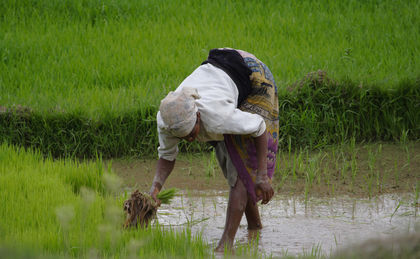Nepal - Agriculture

Agriculture in Nepal has long been based on subsistence farming, particularly in the hilly regions where peasants derive their living from fragmented plots of land cultivated in difficult conditions. Government programs to introduce irrigation facilities and fertilizers have proved inadequate, their delivery hampered by the mountainous terrain. Population increases and environmental degradation have ensured that the minimal gains in agricultural production, owing more to the extension of arable land than to improvements in farming practices, have been cancelled out. Once an exporter of rice, Nepal now has a food deficit.
Over 80 percent of the population is involved in agriculture, which constitutes 41 percent of GDP. The seasonal nature of farming leads to widespread underemployment, but programs to grow cash crops and encourage cottage industries have had some success over the years. Two-sevenths of the total land is cultivated, of which 1.5 million hectares produced 3.7 million metric tons of the staple crop of rice in 1999. Wheat and maize together take up a similar portion of the available land, with harvests of 1 million metric tons and 1.5 million metric tons, respectively, in 1999. Production of cash crops increased substantially in the 1970s, and sugarcane, oilseed, tobacco, and potatoes (a staple food in some areas) were the major crops. Agricultural production accounted for about three-fourths of total exports in the late 1980s. As noted earlier, most exports consist of primary agricultural produce which goes to India. In general the majority of Nepalese farmers are subsistence farmers and do not export surplus; this does not prevent a minority in the fertile southern Tarai region from being able to do so. Most of the country is mountainous, and there are pockets of food-deficit areas. The difficulties of transportation make it far easier to export across the border to India than to transport surplus to remote mountain regions within Nepal. A considerable livestock population of cattle, goats, and poultry exists, but the quality is poor and produces insufficient food for local needs.
Government efforts to boost the agricultural economy have focused on easing dependence on weather conditions, increasing productivity, and diversifying the range of crops for local consumption, export, and industrial inputs. Solutions have included the deployment of irrigation, chemical fertilizers, and improved seed varieties, together with credit provision, technical advice, and limited mechanization. This has had some effect. Land under irrigation increased from 6,200 hectares in 1956 to 583,000 hectares in 1990. The use of chemical fertilizers, introduced in the 1950s, climbed to about 47,000 metric tons by 1998. Still, the weather continues to determine good and bad years for the average farmer. On a national scale, while production of both food and cash crops grew annually by 2.4 percent from 1974 to 1989, population increased at a rate of 2.6 percent over the same period.
Increased agricultural activity has placed tremendous stress on the fragile ecosystems of the mountains, with severe deforestation leading to erosion and flooding that threatens the livelihoods of farmers throughout the country. In the rush to open up arable land in the early years of development, Nepal lost half its forest cover in the space of 3 decades. Government plans to maintain cover at 37 percent depend on the success of community forestry programs, which merge traditional and modern agro-forestry and conservation practices. Responsibility is placed in the hands of Forest User Groups, which included almost 800,000 households in 1999.
A potent issue is that of land reform. Before 1950, a feudal system held sway. Land ownership was concentrated in the hands of landlords who contracted out to tenant farmers. Increased productivity may have been suppressed by such a system. Even though the legal mechanisms for land reform (such as placing limits on the amount of land owned) do exist, in practice most farmers still have pitifully small holdings. Predictably, land reform has been the mandate of every political party in Nepal, particularly the communists.
i am interesting for cow farming in Nepal so how i get your suggestion and help for farming in nepal please give me information
i am interesting for cow farming in Nepal so how i get your suggestion and help for farming in nepal please give me information
i am interesting for goat farming in Nepal so how i get your suggestion and help for farming in Nepal please give me information. then i want to farming in organic agriculture farm in Nepal. which is type recommend in me.
i need the latest information about the percentage of people involving in agriculture in Nepal including totoal GDP contributed by it.(urgent)
Proud to be Nepali. :)
Proud to be Nepali BAJURA
But I m alone
Regards,
Mahendra Yadav (MAHIR)